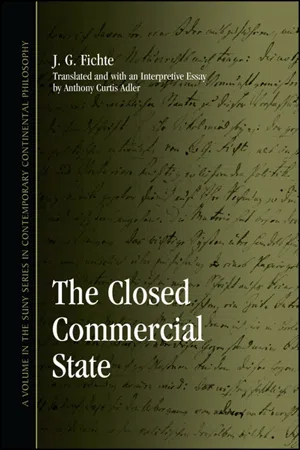
- 259 pages
- English
- ePUB (mobile friendly)
- Available on iOS & Android
The Closed Commercial State
About this book
Appearing for the first time in a complete English translation, The Closed Commercial State represents the most sustained attempt of J. G. Fichte, the famed author of The Doctrine of Science, to apply idealistic philosophy to political economy. In the accompanying interpretive essay, Anthony Curtis Adler challenges the conventional scholarly view of The Closed Commercial State as a curious footnote to Fichte's thought. The Closed Commercial State, which Fichte himself regarded as his "best, most thought-through work, " not only attests to a life-long interest in economics, but is of critical importance to his entire philosophical project. Carefully unpacking the philosophical nuances of Fichte's argument and its complex relationship to other texts in his oeuvre, Adler argues that The Closed Commercial State presents an understanding of the nature of history, and the relation of history to politics, that differs significantly from the teleological notions of history advanced by Schelling and later Hegel. This critical scholarly edition includes a German-English glossary, annotations, and page references to both major German editions.
Trusted by 375,005 students
Access to over 1 million titles for a fair monthly price.
Study more efficiently using our study tools.
Information
On the relation of the rational state to the actual state, and of pure Right of state to politics
Philosophy—what is Right with respect to commerce in the rational state
Principles for answering this question
General application to public commerce of the principles set forth
On the presupposed division of the branches of labor in a rational state
Whether the taxes paid to the state will change anything in the balance of industry
How this balance of industry is to be secured against the uncertainty of agriculture
Whether this balance would be endangered through the introduction of money, and changed through the constant progress of the nation to a higher state of prosperity
Further discussion of the principle set forth here concerning the right to property
History of the present time—the condition of commerce in the actual states of the present
Preamble
The known world considered as one great unitary commercial state
The reciprocal relation of the individuals in this great commercial state
The reciprocal relation of the nations as wholes in this commercial state
The means that governments have employed up till now to steer this relation to their advantage
The result of using these means
Politics—how the commerce of an existing state can be brought into the arrangement required by reason; or, on the closure of the commercial state
More precise determination of the task of this book
The rightful claims of the citizen, as a hitherto-free participant in world trade, on the closing commercial state
The claims of the state, as a self-sufficient whole, during its complete separation from the rest of the earth
Decisive measures for achieving both the closure of the commercial state and the conditions for this closure that have just been set forth
Continuation of the preceding considerations
Further measures for the closure of the commercial state
The result of these measures
The actual reason why one will take offense at the theory we have presented
1.
Table of contents
- Title Page
- Acknowledgments
- Abbreviations and Editorial Apparatus
- Translator's Introduction
- Interpretive Essay: Fichte's Monetary History
- Johan Gottlieb Fichte's The Closed Commercial State
- Translator's Notes
- German-English Glossary
Frequently asked questions
- Essential is ideal for learners and professionals who enjoy exploring a wide range of subjects. Access the Essential Library with 800,000+ trusted titles and best-sellers across business, personal growth, and the humanities. Includes unlimited reading time and Standard Read Aloud voice.
- Complete: Perfect for advanced learners and researchers needing full, unrestricted access. Unlock 1.4M+ books across hundreds of subjects, including academic and specialized titles. The Complete Plan also includes advanced features like Premium Read Aloud and Research Assistant.
Please note we cannot support devices running on iOS 13 and Android 7 or earlier. Learn more about using the app